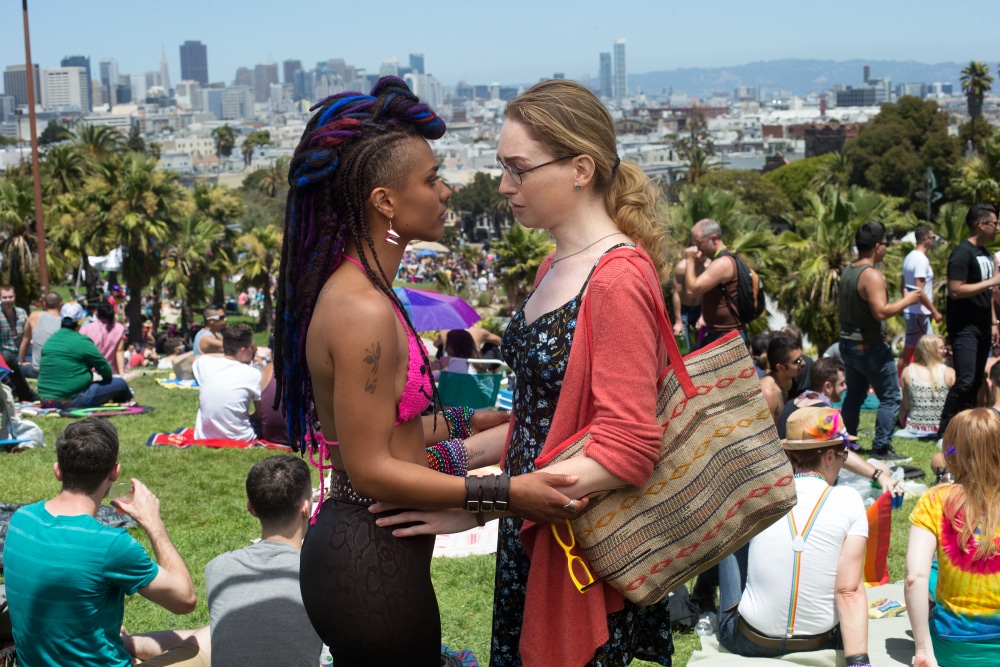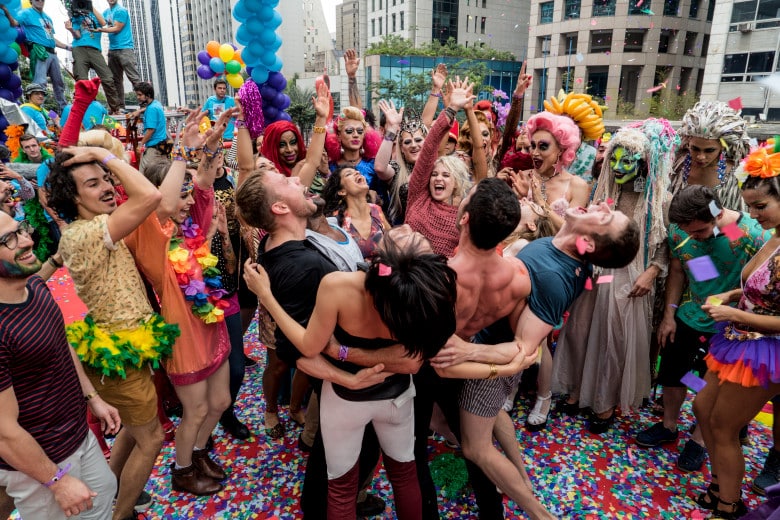(Every month, we at The Spool select a Filmmaker of the Month, honoring the life and works of influential auteurs with a singular voice, for good or ill. Since June is Pride Month, we’re taking a deep dive into the works of Lana and Lilly Wachowski, two of the most prominent – and fascinating – transgender filmmakers around. Read the rest of our Filmmaker of the Month coverage of the Wachowskis here.)
“I am not just me. I am also a we.”
These words, spoken by trans hacktivist Nomi Marks (Jamie Clayton), cut to the sentimental core of Sense8, the ambitious but short-lived Netflix series that currently represents Lana and Lilly Wachowski‘s most recent career output. It’s been a year since the show closed out its story with a two-and-a-half-hour finale movie approved by Netflix after fan uproar following the show’s sudden cancellation; if I’m being honest, I still miss it. And looking back on my own identity and a Pride month overshadowed by a time of tremendous uncertainty for the LGBTQ community, Sense8 feels like a vehicle for a kind of radical empathy our society sorely needs right now.
The Wachowskis have long been obsessed with these ideas of transhumanism and the interconnectivity of humanity: The Matrix with its mass of people physically linked to a vast computer network, Cloud Atlas with its core characters’ constant reincarnation into new settings throughout the ages. Created alongside J. Michael Straczynski and filmed with frequent collaborator Tom Tykwer (as well as former Wachowksi DP James McTeigue), Sense8 feels like the kind of long-form storytelling that finally comes close to containing the breadth of the Wachowski’s narrative and thematic ideas. And even then, two seasons and a movie is hardly enough.
In retrospect, Cloud Atlas seems like a dry run for the narrative ambitions of Sense8 — a show about eight humans in different parts of the world who suddenly discover that they are “sensates”, an evolved species of humankind that can share thoughts, feelings, and sensations freely among each other. If one gets sad, they all weep; if one gets shot, they all feel the pain; if one of them has an orgasm… well, you get the gist. Of course, not long after discovering each other, they also find themselves on the run from shadowy government agents who seek to eliminate sensates and keep them suppressed, or use them for their own nefarious purposes.
The actual stakes and scope of this part of the conflict is fairly nebulous; it’s never entirely clear how big BPO is, what its goals are, or how important it is to stop them beyond the immediate survival of our heroes. While the skill-sharing aspect of being a sensate is used to some glorious and visually appealing effect in the show’s action beats (characters flit elegantly in and out of frame as they take over each other’s bodies, for instance), it’s hardly Matrix-level spectacle.

But honestly, the cat-and-mouse game between the sensates and BPO isn’t the point, which is what makes Sense8 so radical. It’s a science fiction action show first and foremost, but the show flits about in genre as much as its characters do in identity, nationality, gender, and sexuality. The ‘cluster’ of sensates we follow is an eclectic group of dynamic personalities: there’s Will Gorski (Brian J. Smith), a Chicago cop who serves as the erstwhile white guy lead; kickboxing Korean badass Sun Bak (Doona Bae); Nairobi van driver Capheus a.k.a. “Van Damn” (Aml Ameen in the first season, Tony Onwumere in the second); the aforementioned Nomi, a transwoman activist in San Francisco; Indian pharmacist Kala (Tina Desai); Icelandic DJ Riley Blue (Tuppence Middleton); German gangster Wolfgang (Max Reimelt); and Spanish movie star (and closeted gay man) Lito Rodriguez (Miguel Angel Silvestre).
Each of the sensates exists in their own orbit, Sense8 shifting Cloud Atlas-style to each of their storylines, which were actually filmed on location in that specific corner of the world. As such, they each have their own supporting casts, many of which are too numerous to name here. The show occasionally threatens to feel like eight disparate shows clumsily mashed together — police intrigue in Chicago, Bollywood romantic triangles in Mumbai, the telenovela melodrama of Mexico City. Some storylines work better than others; the heightened farce of Lito’s journey to self-acceptance, or Nomi’s assertion of her identity as a trans woman, are inherently more interesting than the inter-sensate romances between Kala and Wolfgang, or Will and Riley.
And yet, that shagginess works to the show’s favor, especially as the sensates begin to get in each other’s heads and their stories cross-pollinate. There’s something inviting about seeing one sensate pop into the other’s mind to help them with a problem, it’s a heart-to-heart or a desperately-needed ass-kicking from Sun, Will or one of the cluster’s other fighters. (By the time all eight of them are working in concert, using their different skills to pull off incredible capers, often in a single physical body, they’re practically unstoppable.) Suddenly, you see that all these stories from different parts of the globe are all one story. It’s not hard to recognize the virtues of Sense8‘s message, plastered in big, bold, glittering letters across every frame: we’re all connected to each other through a commonly shared human experience, making the divisions of nation, gender, sex, race, and identity far more arbitrary than we think.
I am not just me. I am also a we.
Nomi
Of course, Sense8 is boundary-pushing in other ways; it’s probably one of the queerest and sex-positive shows ever committed to television. In our modern parlance, Sense8 is horny — virtually every character fucks and fucks hard. Our first real introduction to Nomi comes (no pun intended) as she has explicit, enthusiastic sex with activist girlfriend Amanita (Freema Agyeman), complete with a close-up of a rainbow strapon glistening from, well, use. Some of the show’s most out-there moments feature giant psychic orgies in which the entire cluster surrender into an undulating mass of limbs, caresses, and moans. Hell, the series finale ends with a giant telepathic fuckfest that folds in their respective loved ones, closing out with a lingering shot of that very same rainbow strapon.
Sense8 demands you leave your hangups about sexuality at the door but does it in a way that doesn’t feel tawdry or exploitative. All of the sex in Sense8 is gentle, enthusiastic and deeply consenting, artfully filmed in Toni Braxton music video-level shots of slow-motion thrusts and flexing butts, warm sepia tones washing over our participants. It’s all gorgeous and hot and accepting, and it’s hard to be mad at its explicitness when everyone’s having too good a time.

For queer audiences, who don’t normally get this kind of mainstream representation in a major streaming series, Sense8 feels revolutionary. It’s not just a show featuring queer and trans people, but made by and for them — trans women writing for and directing trans woman playing trans characters. Several other characters realistically wrestle with their own sexuality (Lito fears the consequences to his movie career by coming out amidst the homophobia of mainstream Latinx culture), and poly relationships aren’t hard to find among many of the supporting characters. (The love triangle between Wolfgang, Kala and Kala’s arranged husband Rajan (Purab Kohli) resolves itself, refreshingly, by just turning them into a throuple.)
But even those who identify as straight are never shown to be uncomfortable with the pansexual nature of their sensate experiences — even when ostensibly straight male characters like Will and Capheus find themselves taking in the pleasure of their fellow sensates, it’s mostly greeted by a pleasing sense of discovery. There’s something deeply intimate about being a sensate, about knowing someone that intimately, that makes their cluster feel like a transhumanist ideal. It’s an appealing thought, to be sure, and the warmth and love the cluster feels for each other by the end of the show is something we all yearn for on some level.
Make no mistake, Sense8 is gooey and sentimental, deeply sincere in that Wachowski way. Characters talk about love and destiny in complete earnestness, unafraid to show their feelings or surrender to the emotions of a moment. Sense8 wears its heart (all eight of them) on its sleeve and dares you to get on its level. One of the show’s greatest litmus tests comes in the show’s fourth episode, in which each of the sensates end up hearing Four Non Blondes’ “What’s Up?” through their psychic link, resulting in a Magnolia-style moment of connection between our disparate heroes. If you watch a montage of eight people across the globe engage in telepathic karaoke to a cheesy ’80s ballad and cringe, this may not be the show for you. But if you can open your heart and soul to these characters and drink in their unapologetic joy — for each other, for their loved ones, for the simple pleasures of everyday life — Sense8 feels like a beloved companion.
Given the show’s lukewarm reception in its release, low numbers, and high price tag, it’s likely we’ll not see the likes of Sense8 again. One hopes that the Wachowskis don’t retire like they’ve been rumored to; the Matrix prequel movie seems to be a hint that they’re not going anywhere soon, which is refreshing. Lord knows the world needs their particular brand of empathy, understanding and universal love right now. But if Sense8 ends up being the last thing they direct, it’s a hell of a note to go out on — perhaps the greatest distillation of their empathetic, pluralistic worldview.

As a bi man who hasn’t been out for every long, I credit Sense8 with fostering a greater sense of ease with myself and my identity. The show makes you feel like the ninth member of their cluster, Sense8 drawing you in with a deep well of love for its characters and an eye towards embracing joy. I love each of these characters, mostly because I feel like they’d love me back.
I was lucky enough to see the series finale movie in a packed theater at the Music Box in Chicago, with Lana and much of the cast in attendance; watching it with an audience felt like being part of a cluster of its own, every one of us laughing, cheering, crying and gasping in unison. (The finale movie, like many quick wrap-ups, is rushed and messy even for Sense8, but it still carried the show’s warm, human essence, one elevated by sharing that experience with others.)
I haven’t been to a Pride parade yet, but watching Lito attend his first Pride in season two made me feel like I was there too — cheered for, embraced, celebrated. It’s a show about a group of marginalized people finding community in a world that hates and fears them; even without the explicit queer bent, that’s a premise that resonates for anyone who’s felt outside the norm for whatever reason.
We need that kind of love and solidarity now more than ever — a desire to reach out and embrace our differences while recognizing the need to fight for each other. In that sense, Sense8 feels radical and transformative, even in its flaws. It may have left us too soon, but the show has left a psychic imprint on its fans, one I hope can be transmitted to others as long as it stays on Netflix.
Happy Pride, everyone – whoever you are, whatever you feel, whomever you love, let’s all form one giant cluster together. And now, I’ll let Nomi have the final words: